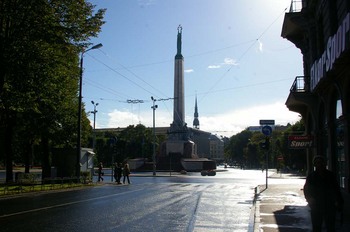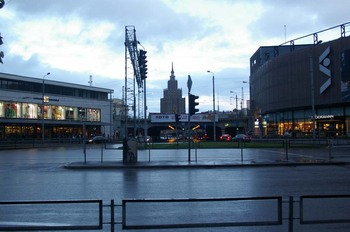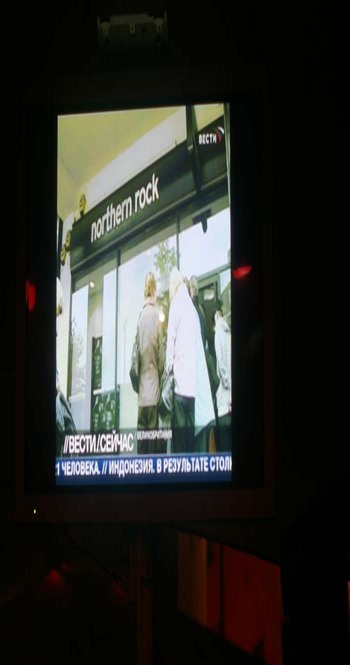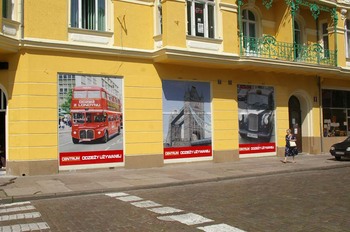We are developing the social individualist meta-context for the future. From the very serious to the extremely frivolous... lets see what is on the mind of the Samizdata people.
Samizdata, derived from Samizdat /n. - a system of clandestine publication of banned literature in the USSR [Russ.,= self-publishing house]
|
In between getting depressed about the way things are going back in London, it is worth thinking about things that have improved in the last couple of decades. This city, with its beautiful Art Nouveau architecture (much of it designed by Mikhail Eisenstein, father of Sergei) was part of the Soviet Union a mere 20 years ago, with all the bleakness and tyranny that this implied. Today, it is modern and that is in the past, although still occasionally visible in the distance.
I can fly here from London for not much more than £50 return. Rather more importantly, Latvians are free to fly to London for not much more than £50 ($100 US) return, and free to live and work in the UK, and many other places.
The beer here is excellent, and the coffee not quite so excellent (a northern European thing in both cases, I think). One can sit outdoors in beer garden in the evening, listening to live music, drinking beer, and watching a TV news channel that the proprietors of the bar have provided for patrons. It is like being in many other places, other than that the languages and channels are different. Even in Germany one often seems to find oneself watching Sky News or CNN in English. Not so much here.
Here, despite the similarity of the stories, there is still some sense that there is a bear in the room. On the other hand, watching a Chelsea game with commentary in Russian seems perfectly right, somehow, so I suppose the invasion has gone both ways.
(Click for larger versions of the above photographs).
Correction: When I first posted this I wrote “Art Deco” when I meant “Art Nouveau”. Also I misspelled Mikhail Eisenstein’s name. Apologies. Must get more sleep.
The next time the Russian airforce tries to test the UK air defences (which seem to be working fine), perhaps the boys in grey-blue should paint a big sign on the side of the Typhoon fighters saying this: “The way to Harvey Nichols’ jewellery department and Chelsea FC is that way, chaps”.
Seriously, what the expletives deleted does Putin think he is trying to prove, exactly? It is not as if one of those “Bear” aircraft are state-of-the-art. Ironically, there has been a lot of criticism about the expense of the Eurofighter project – justifiably – but at least the RAF have a superb fighter. Let us hope they do not have to remind the Russians of what an outstanding force the RAF still is.
Evidence that East German borders guards had a clear ‘license to kill’ anyone who tried to cross the country borders. By the way, I just love how the BBC uses the communist term ‘defectors’. So leaving a totalitarian, communist hell-hole counts as ‘defection’? WTF?
But I digress.
Border guards in East Germany during the Cold War were given clear orders to shoot at attempted defectors, including children, a senior official says.
The seven-page document dated 1 October 1973, was found last week in an archive in the eastern city of Magdeburg, among the papers of an East German border guard.
I am sure it was not the only document in existence. At least there is some tangible evidence now. It reads:
Do not hesitate with the use of a firearm, including when the border breakouts involve women and children, which the traitors have already frequently taken advantage of.
This has not come as a surprise to me. What was a surprise is this has not been officially known, confirmed, understood before. It is as if the societies that went through (and were complicit in) the communist ordeal are reluctant to confront the full horrors, the corruption and destruction that were at their core for decades.
I whole heartedly agree with Marianne Birthler, director of the government office that now manages Stasi archives, when she says.
We have a long way to go in reckoning with the past.
Barely started, I would add.
On a related note this is my reaction to the movie The Lives of Others when I saw it not too long ago.
Three weeks ago it was a long weekend in the UK, and on Monday afternoon I therefore somehow found myself wandering fairly aimlessly around the centre of Szczecin in Poland. After contemplating for a little while that one of the major differences between communism in Poland and East Germany was that in Poland churches were rebuilt lovingly, whereas in East Germany they were dynamited for ideological reasons, and just thinking about how many ghosts there are in sites of ferocious battles between the Wehrmacht and the Red army, I found myself staring at these advertisements on a wall.
Not speaking Polish myself, I was entirely baffled by what this was saying or why, other than whatever it was having a certain amount of latent Anglophilia in it. Therefore I just took the photo and walked on.
Last night, while having a few beers in a pleasant London bar with a fellow Samizdatista, I took the opportunity of asking a Polish waitress what it meant. She looked at it for a moment, paused, and said “That is very weird…… They sell vintage clothing….weird”, poured my beer into my glass, and walked off.
In truth that only enhanced the mystery. Further questions arise. What exactly does it say on the front of the bus? Do the proprieters of this business use mod fashion to express the essense of London’s street fraternity culture? I need to know Perhaps the readership can help?.
In Poland a court has ruled that the governments attempts at de-communisation are unconstitutional.
The law required some 700,000 people, including school directors and board members of public companies, to submit statements declaring any contact they had had with the communist secret services.
The court rejected key aspects of the law including the requirement for journalists to submit declarations. […] “A state based on the rule of law should not fulfill a craving for revenge instead of fulfilling justice,” he said. “Screening must not be used for meting out punishment.”
But surely justice cannot be served by allowing the communist era and above all, the role of the people who made it all possible, to vanish down the memory hole. If people did despicable things during the communist era, why should they escape punishment? I cannot imagine a German court being allowed to stop the process of de-nazification in German, so why tolerate something similar in Poland in the aftermath of communism?
Forgiveness can not come before repentance and a lot of people have yet to repent. I wonder if there are any senior judges who might have an embarrassing file on their communist era activities that they would rather not see the light of day? Just wondering.
I thought this is one of the cases where technology is nothing but good news…
German researchers said Wednesday that they were launching an attempt to reassemble millions of shredded East German secret police files using complicated computerized algorithms. The files were shredded as the Berlin Wall fell in 1989 and it became clear that the East German regime was finished. Panicking officials of the Stasi secret police attempted to destroy the vast volumes of material they had kept on everyone from their own citizens to foreign leaders.
Some 16,250 sacks containing pieces of 45 million shredded documents were found and confiscated after the reunification of Germany in 1990. Reconstruction work began 12 years ago but 24 people have been able to reassemble the contents of only 323 sacks.
Using algorithms developed 15 years ago to help decipher barely legible lists of Nazi concentration camp victims, each individual strip of the shredded Stasi files will be scanned on both sides. The data then will be fed into the computer for interpretation using color recognition; texture analysis; shape and pattern recognition; machine and handwriting analysis and the recognition of forged official stamps
Until I read the final paragraph.
Putting the machine-shredded documents together requires analysis of the script on the surface of the fragments. The institute has already had success putting together similarly destroyed documents for Germany’s tax authorities.
But then, it is never the technology that is at fault, but people and the uses they put it to…
No matter, I am very pleased to hear that there is some work somewhere being done on the past of former communist countries.
via Dropsafe
I am writing this in an airport bar in Prague, where I am having a beer before flying back to London after a weekend away. I will probably write most of the post on the flight home, but it probably will not get posted until I am back in London tomorrow( and this is indeed what has happened. MJ )
This is my second trip to Prague. I was first here in 1992. That trip also involved (amongst other places) Warsaw and Budapest. I had not been back to any of these places again until this year, when I have been back to both Warsaw and Prague. Both Poland and the Czech Republic are much easier places to visit than in 1992 in the sense that I do not need a visa to visit either country, there are lots of ATMs from which I can obtain money, there is less bureaucracy, there are western branded shops on the high street, there are Starbucks clones (although not yet Starbucks itself). In 1992 there were none of these things and travel was harder (I was also in my early 20s and a much less experienced traveller, so my perception may be distorted). However, although Poland and the Czech Republic are now both members of the European Union, the cities both lack the shining new Metro systems, motorways of poorer countries (Spain and Portugal, particularly) that have been dipping in the cohesion fund for longer. Infrastructure works in both places, but it is more spartan.
In 1992, Warsaw felt rather bleak and Prague felt to be a glorious gothic fairytale of a city that had been left behind by the world but which was perhaps catching up. (Budapest was the first city I had been to with a strong Ottoman character about it, and the dominance of the buildings on the high hills overlooking the Danube from the Buda side was and no doubt still is very striking). This year I rather liked Warsaw – it has the feel of a place where business is being done. Prague is still a glorious gothic fairytale of a city, there is lots of good music to listen to, the beer is very good and very inexpensive. The food options are much more diverse than they were 14 years ago. Since the invention of the euro gutted the Dutch money changing industry, the strip between the Charles Bridge and the Old Square in Prague seems to have taken over from that between Centraal Station and Dam Square in Amsterdam as the leading venue in Europe for dodgy money changers and slightly dubious pizza restaurants (the ‘Museum of Medieval Torture Instruments’ seems very old Amsterdam, too).
However, Prague seems to now be perhaps a little too obvious a destination for the more trendy sorts of tourist. People who are seen at the Netherlands Architecture Institute or the Oslo School of Design, and drink in bars with lots of black and chrome and 45 different kinds of vodka (and wear a fair amount of black, but probably only about the right amount to be in keeping with the chrome) tend not to be seen here. It seems more now to be a destination for Anglophone backpackers and American students from universities outside the Ivy League. It is a backpacker destination. It has not moved as far up the tourism food chain that I had hoped it might.
And, alas, I feel I am being a little unkind. I have, in truth had a bad experience today, which has to do with the way in which the tourist ecosystem in Prague has evolved to take advantage of the people who have visited.
Regular readers of this blog will know that I travel a lot. (I will eventually explain what I did in Denmark last weekend. Honest). I generally know what I am doing in a foreign city. I like to believe I am fairly defensive and steet smart, and as I am also a relatively large and scruffy male who at least thinks he does not look prosperous, I have seldom had anyone try to rob me, or otherwise hassle me.
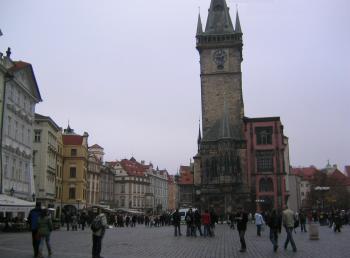 In fact, the only time anyone previously tried to rob me was in Prague in 1992. I started the trip by myself, but by the time I was leaving Prague I found myself in the company of a girl from Brisbane in her early twenties and a slightly mad television journalist from Los Angeles. The three of us went to a railway station in the evening in order to catch the overnight train to Budapest. As we were about to get into the train, a group of loudly talking people crowded around and towards us. My wallet was foolishly in my back trousers pocket, but I was smart enough to respond by immediately putting my hand on it. I discovered that there was another hand on it, trying to pick my pocket. Once the thief realised I was on to him, he rapidly withdrew, but his friends did not. I should have yelled thief at that point, but I am shy and unassertive, so I did not. I few seconds later, I did hear a yell, as the American TV journalist realised that his bag had been unzipped and a hand was in it. He yelled loudly, and the thieves withdrew. Although they tried to rob us, looking back I am struck by what amateurs the pickpockets were in 1992. We were pretty naive too, but still they failed to rob us.
Since then, I have always put my valuables in my front pockets, and I do continue to look a little scruffy, which I have believed meant I was perhaps not an obvious target. Alas, though, this afternoon the thieves figured me out and robbed me anyway. This time they were good at it. → Continue reading: Of Prague and pickpockets
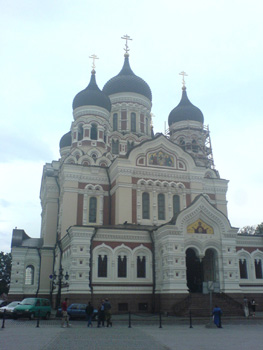
I think that this building (the Alexander Nevsky Orthodox Cathedral in Tallinn) is every bit as assertively a statement that the Russians are in charge as is the Palace of Culture in Warsaw I wrote about earlier this year. It comes from a different Russian era (the Cathedral is a Czarist structure, completed in 1900), but I think the motives for building the two structures were not too different . Certainly the Cathedral is in every bit as prominent a location as the Palace of Culture – it is on the top of the Toompea hill in Tallin’s Old Town, directly opposite Tallin castle (now the Estonian national parliament). Certainly, also, it is every but as architecturally out of character from the historical city, which in style is a typical Baltic Hanseatic League city, although the people of the city are clearly very proud of the medieval town hall
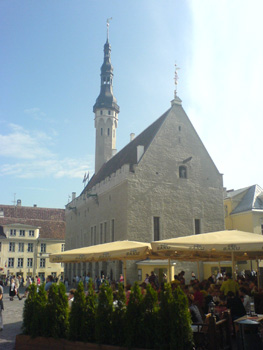
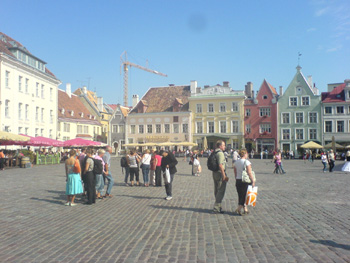
It is only six years since I was last in Tallinn, but the city certainly seems to have come a long way since then. At that point the Old Town was beautiful, but the rest of the city felt grimy when I left it. No longer. It’s not a terribly large city (half a million?) and it is not as frenetic as some larger cities, but it has the air of a place becoming, well, comfortable. Modern office buildings going up. Suburban tracts of nice, large houses being built on the waterfront to the west of town. That kind of thing. There are lots of Soviet housing estates between the old centre and the nice suburbs, but in truth I have seen worse in London. And Paris. And Amsterdam. It is difficult to believe that this was part of the Soviet Union only fifteen years ago. But it was.
And it was certainly a nice touch to be able to talk to friends in Australia using a software product that was developed here. The computer markets of China are full of people attempting to sell you cheap Skype handsets. However, Tallinn gave us Skype itself. That is worth more.
Now that the protests are no longer anticipating the overthrow of the Lukashnko government in a display of ‘people power’, the mainstream media moves elsewhere. The narrative of the post-Soviet dictator in Belarus is an uncomfortable fit with the comforting delusions of the West. The latest project to promote civil society is the radio station funded by the EU, the USA and the Czech Republic, broadcasting out of Warsaw. It has a mixture of healthy cultural programming and news, broadcast over a number of media: AM, FM and the internet. However the name, European Radio for Belarus, can only have been dreamt up by the Commission. One suspects that any popularity will be achieved despite its title, not because of it. Its more ferocious counterparts, Radio Svoboda/Radio Free Europe, campaign more directly for democracy.
European Radio for Belarus, is despite its name, not a foreign station broadcasting into Belarus. Rather, it is a Belarusian station just temporarily coordinating its operations in Warsaw. There is also an office in Minsk and correspondents all over Belarus. Operating since February 2006, European Radio for Belarus is funded by the United States and Czech governments, and the European Commission.
We have been asked frequently by other journalists, that are you like Radio Svoboda, Radio Free Europe which said that when democracy comes, it closes the next day. And we say that it is not our goal. We are doing vice versa, we hope that when changes come, we can return there and work as a professional, attractive radio station with balanced information and education content which would be really recognisable by people in Belarus. I think this is the main difference of our project and other pro-democracy projects around Belarus.
Just to remember that this is another day in Belarus: Anatoly Lebedko, opposition leader of the Belarussian United Civil Party was detained whilst attending an unofficial protest on the seventh anniversary of former Interior Minister Yury Zakharenko’s disappearance; and graffiti artist Artur Finkevich was imprisoned for two years hard labour, after writing “We want a change”.
Lukashenko is the enemy of change, improvement and progress: all of these trends will end his reign, or force him to fundamentally adapt to new ways. Now that there are more windows on the world, the yearning for change amongst those who can only spectate becomes ever more desperate.
The Ukraine is not exactly famed for its high standards of probity and decency in the field of business, as this article suggests. It was certainly a bit of an eye-opener to see this failed, disgraced British cabinet minister, Stephen Byers, on the slate to opine at a conference all about the marvellous business opportunities out in that country. Great. The man who confiscated the assets of Railtrack shareholders – in retrospect a key point signalling the true intent of New Labour towards investors – is considered worthy to share his thoughts about encouraging enterprise in the Ukraine. Riiiight.
Perhaps in a fairer spirit, though, there may be a good case to make for economic opportunities in that country, and I could not help noticing that the organising firm of the conference goes by the moniker Adam Smith (no relation, it seems, to the Adam Smith Institute). It does strike me as mighty odd that a character like Byers should be prime billing at such an event, though. The citizens of that nation surely deserve better.
As expected, the electoral results from Belarus were a load of cobblers. Now the unexpected protests have started, with an estimated 5,000 brave protestors supporting the opposition candidate, Milinkevich, and declaring the elction null and void.
Thousands of protesters thronged the main square of the Belarusian capital on Sunday in defiance of a government ban, refusing to recognize a presidential vote that appeared all but certain to give the iron-fisted incumbent a third term.
The crowd hooted when a large video screen broadcast a live statement from the Central Election Commission chief, who announced results that showed President Alexander Lukashenko headed toward overwhelming victory in Sunday’s vote.
The protesters chanted “Long Live Belarus!” and the name of the main opposition candidate, Alexander Milinkevich. Some waved a national flag that Lukashenko banned in favor of a Soviet-style replacement, while others waved European Union flags. Milinkevich arrived at Oktyabrskaya square later.
These are the results from the election thief:
The elections chief, Lidia Yermoshina, said Lukashenko had won 89 percent of the vote, according to returns from nearly one-fifth of polling districts. The results virtually guaranteed a third term for the authoritarian leader who has ruled the republic since 1994.
“Lukashenko cannot have won 80 percent!” he said, referring to exit polls conducted by two groups the opposition says are loyal to the government and released just hours after voting began that projected he would win more than 80 percent of the vote.
“Cannot! Cannot! Cannot!” the crowd chanted.
Let us remember that Lukashenko has no qualms about viewing all of these protestors as terrorists. Russia will stand idly by, with the satisfied smile of Reynaud, and the EU will wring its hands, a pity it isn’t its own bloody neck!
However, I am quite pessimistic about the outcome. Lukashenko has the support of stagnation amongst the majority of the population. Only those whose future hopes have vanished under this regime will be in the square tonight.
Now we wait for Lukashenko’s move…frostbite or tanks?
Whenever I write about something touching on my experience of communism, I get a few kind commenters encouraging me to share more of it. I rarely do so, as busy life takes over. Still, today I managed to post an article on my other blog, Media Influencer, that I felt was perhaps not coherent enough or too personal for Samizdata.net. For those interested, follow the bananas…
|
Who Are We? The Samizdata people are a bunch of sinister and heavily armed globalist illuminati who seek to infect the entire world with the values of personal liberty and several property. Amongst our many crimes is a sense of humour and the intermittent use of British spelling.
We are also a varied group made up of social individualists, classical liberals, whigs, libertarians, extropians, futurists, ‘Porcupines’, Karl Popper fetishists, recovering neo-conservatives, crazed Ayn Rand worshipers, over-caffeinated Virginia Postrel devotees, witty Frédéric Bastiat wannabes, cypherpunks, minarchists, kritarchists and wild-eyed anarcho-capitalists from Britain, North America, Australia and Europe.
|
